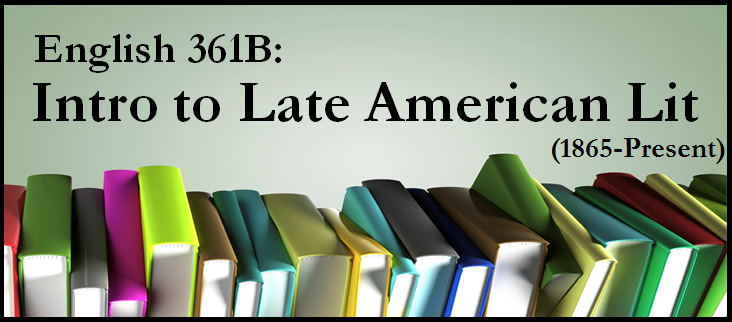Taught face-to-face.
Course Description and Philosophy:
As the title suggests, this course offers an introduction to “late American literature,” which is not as straightforward a term as one might first think. “American” is usually used to designate any literature written by an American OR written in/about the American experience. So that means we claim literature by Americans that are written or take place outside the U.S. It also means we claim literature written by authors of other nationalities that is written about living in America.
Similarly complex is he term “literature,” which most folks agree means writing in genres like prose (novels and short stories), poetry, and drama (plays). In this class, we will also extend that list of genres to include non-fiction essays, film/television, and comic books/graphic novels.
Another unspoken definition for “American lit” is those works written in English (although this is something that is changing and you will see non-English words working their way into texts as we move into more contemporary times). Generally, as is the case here, “late American lit” indicates that literature written/published following the end of the U.S. Civil War in 1865. Obviously, we cannot hope to cover all such literature written in the last century and a half in one course. However, we will explore several significant authors who fall within these parameters and who have contributed to the shape and character of American literature.
As we read, we will examine themes related to authors and literature representing all variety of socio-economic class status, race/ethnicity, sexuality, gender performance, physical ability, and wellness. We will also explore the historical context of the authors and their topics, comparing how similar topics are dealt with in differing times and geographical locations. Every author’s experience and background is unique, yet their writings often have universal appeal and offer insight into the human condition. We read literature to gain an understanding of what it is to live another’s life, as well as to understand the literary culture that has shaped the stories we tell today about what it means to live in America.
Course Objectives:
- To gain familiarity with American literature since 1865
- To explore the scope of “American literature,” particularly in relation to questions of genre, authorship, production, and language
- To learn about and practice critical reading and analysis skills, particularly in relation to American literature
- To practice literary critique through written analysis of course texts
- To practice research and oral communication skills through in-class presentation of individually researched material
Texts:
- Norton Anthology of American Literature, Shorter 7th Edition, Vol. 2, Ed. Nina Baym, et. al., ISBN: 978-0393930559
- Pudd’nhead Wilson, Mark Twain, ISBN: 978-0743487788
- A Raisin in the Sun, Lorraine Hansberry, ISBN: 978-0679755333
- Kindred, Octavia E. Butler, ISBN: 978-0807083697
- Uncle Sam, Deluxe Edition, Steve Darnell and Alex Ross, ISBN: 978-1401223489
- MLA Handbook for Writers of Research Papers, 7th Edition, ISBN: 978-1603290241



